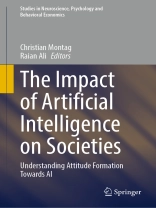This book presents a recent framework proposed to understand how attitudes towards artificial intelligence are formed. It describes how the interplay between different variables, such as the modality of AI interaction, the user personality and culture, the type of AI applications (e.g. in the realm of education, medicine, transportation, among others), and the transparency and explainability of AI systems contributes to understand how user’s acceptance or a negative attitude towards AI develops. Gathering chapters from leading researchers with different backgrounds, this book offers a timely snapshot on factors that will be influencing the impact of artificial intelligence on societies.
Chapter 12 is available open access under a Creative Commons Attribution 4.0 International License via link.springer.com.
Table of Content
1. Starting the journey to understand attitudes towards artificial intelligence in global societies.- 2. The measurement of attitudes towards Artificial Intelligence: An overview and recommendations.- 3. Modalities of AI Operations and Their Impact on Users’ Attitude Towards AI.- 4. Exploring AI Interaction Modalities in Virtual Environments and its Impact on Users’ Attitudes.- 5. Personality associations with attitudes toward AI.
About the author
Christian Montag serves as a Professor for Molecular Psychology at Ulm University, Germany. He received his diploma and Ph D degree in psychology in 2006 and 2009, respectively, and his habilitation in the same field in 2011. From 2016 to 2022 he was an Agreement Professor at the University of Electronic Science and Technology of China, in Chengdu. Since Autumn 2023, he is also an Adjunct Professor at Hamad Bin Khalifa University, Qatar. Christian Montag’s research is at the intersection of psychology, neuroscience, behavioral economics and computer science. His topics include digital phenotyping, mobile sensing and Internet Use Disorders. He is also interested in understanding how AI is influencing societies.
Raian Ali serves as a Professor in the College of Science and Engineering at Hamad Bin Khalifa University, Qatar. With a Ph D in Computer Science from University of Trento, Italy, he previously worked at the University of Limerick in Ireland and at the Bournemouth University in the UK. Raian Ali’s research is interdisciplinary, focusing on the interplay between technology and human behavior. His topics include digital wellbeing, digital addiction, and persuasive systems design, among others.












